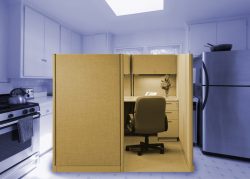A 2020 tax on vacant storefronts in San Francisco went into effect this month despite calls for further delay from commercial property owners who say they’re still feeling the impact of Covid-era shutdowns.
About 70 percent of voters backed the tax in March 2020, two weeks before the city went into lockdown. Aimed at store owners who don’t fill ground-floor commercial spaces after six months of vacancy, it was expected to raise between $300,000 and $5 million a year for a small business assistance fund. It was delayed for a year last January.
As Omicron pushes up infection rates yet again, there’s little reason for owners to hold out for the prospect of higher rents. Supervisor Aaron Peskin, the legislation’s author, told the San Francisco Chronicle that no group had called for further delay in the tax and the time’s right to make opening businesses in the city’s numerous vacant storefronts more affordable.
“It’s designed to be a behavior changer, not a money generator,” said Peskin, whose district includes North Beach, Chinatown, Russian Hill and Union Square.
While Peskin didn’t acknowledge calls to delay the tax, some landlords say it will penalize them for a lagging market that’s beyond their control. They say that their situation has become more tenuous because of the city’s repeated closures and strict safety requirements over the past 20 months. That’s on top of global trends like online shopping and a byzantine permitting process, issues they said two years ago were bigger barriers than high rents.
“Who would want to open a business in SF at all now?” San Francisco landlord Betty Louie told the Chronicle. “There are 10,000 fees you have to pay, months-long permitting and other bureaucratic hurdles to go through. And now we have this tax? The timing couldn’t be more off.”
The tax starts at $250 per linear foot of storefront facing the street, rising to $500 and then $1,000 for additional years that a space remains vacant. If the building is leased, but vacant, the tenant is responsible for paying the tax. It’s valid only in about 30 neighborhood commercial areas and doesn’t include Union Square and the Financial District, which have been hit especially hard by organized retail theft and work from home policies.
San Francisco isn’t the first US city to pass such a tax. Washington, D.C., has had a higher tax bracket for vacant commercial and residential properties since 2011. New York City and state were considering adding taxes around the time San Francisco passed its measure, although they’ve been set aside during the pandemic.
Read more


[SF CHRON] –Emily Landes
